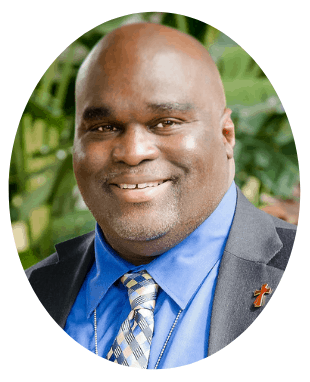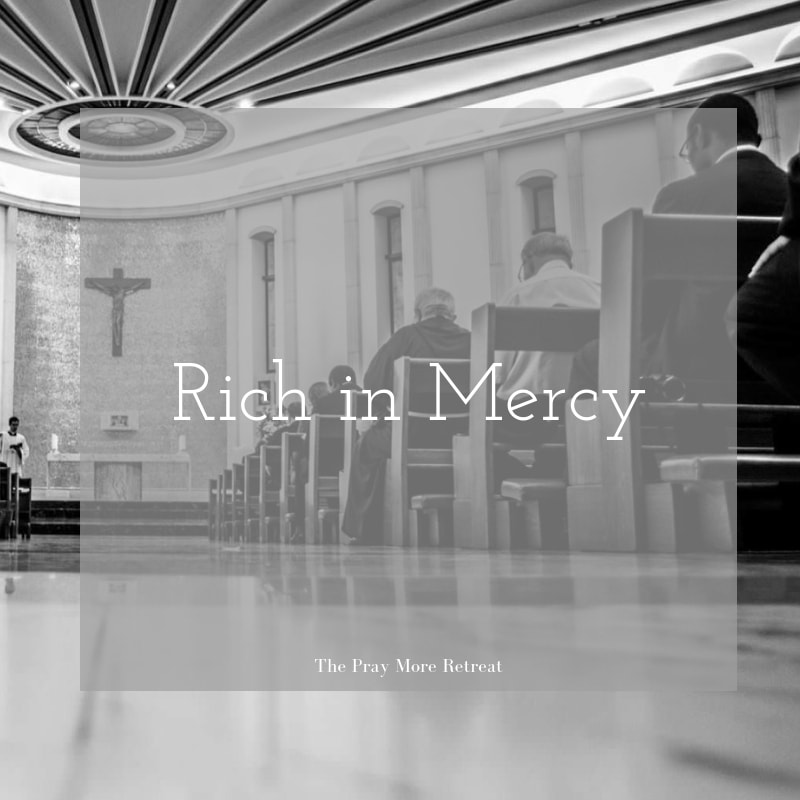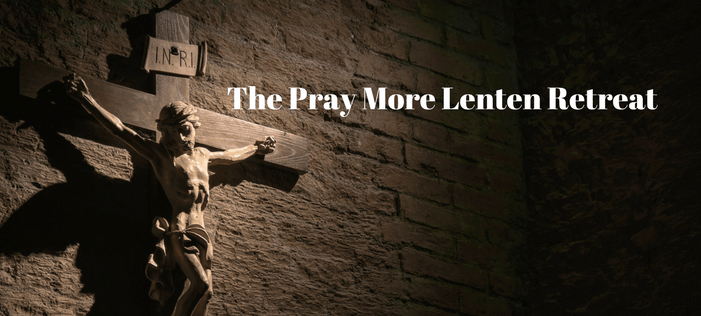Summary
As humans, we are all prone to sinning. But what’s most important is having the desire to repent for our sins. In this talk, Deacon Harold Burke-Sivers discusses the importance of choosing God and repentance for our sins throughout our lifetime. He shares an interesting story and reflects on scriptures on how we can seek example from the ways of Jesus towards sin.
Thank you for watching and participating in this retreat!
Not Registered, yet? Don’t miss the rest of the talks! Register for the Pray More Retreat!
Downloads
Audio MP3
Click here to download audio file.
Printable Study Guide PDF
Click here to download the printable study guide.
Printable Transcript PDF
Click here to download transcript of the video presentation.
“God created us without us: but he did not will to save us without us.”116 To receive his mercy, we must admit our faults. “If we say we have no sin, we deceive ourselves, and the truth is not in us. If we confess our sins, he is faithful and just, and will forgive our sins and cleanse us from all unrighteousness.”
1 John 8-9
Reflective Study Guide Questions
- Conquering sin in our lives begins with a personal transformation and understanding that God is Love. How have you not accepted this truth? How have you not believed that God is Love in your life?
- Sin damages our relationship with God. Can you see how that’s happened in your life and with your particular sins? On the other hand, have you also allowed yourself to be welcomed back into the fold of God’s mercy through Reconciliation? What did that feel like?
- What is it that keeps you from going to confession more often? How can you spend some time in prayer sharing those thoughts of yours with God, and discussing it with a close friend or family member?
- Deacon Harold says that sin happens when we think we know more than God. When have you seen that play out in your life?
- The love of human beings often fails us and people turn away from us. God isn’t like this. His love never fails and He doesn’t turn away from us. How have you confused who God is, in this way? How have you thought of Him in the terms of how you think of other people in your life?
Text: Rich in Mercy
Opening Prayer
Let us pray. God, our Father, we give You honor and praise, glory, blessing, and thanksgiving. We thank You for this day, we thank You for the gift of our life, we thank You for the incredible love and mercy You have shown to us through Your Son, our Lord Jesus Christ. We thank You for the incredible power of reconciliation and forgiveness, which You have bestowed so abundantly upon us. Lord, allow us to be vehicles of Your mercy and reconciliation to others, so that as You forgive us, we will also forgive those who trespass against us. We ask this in Your holy and precious name. Amen.
We all live with the reality of human frailty and weakness, both within ourselves and in those that we love. We must recognize and acknowledge the reality of sin. That it affects us and speaks to us within the depths of our being. Yet we cannot allow the pain of sin and the suffering that it causes to take root in our hearts. We cannot allow sin to control us, or its anguish to overwhelm us. Conquering sin in our lives begins with personal transformation, with an interior conversion that reveals the fundamental truth that God is love. Sin damages our relationship of life-giving communion with God and, through the sacrament of reconciliation, our merciful Father restores us to life.
The Colleagues
Let me give you an example. Say you are working at your job, you’re in the office, and you work at a cubicle. And the person next to you, you find out from the water cooler, is someone who’s fallen away from the faith, and you decide “You know what? I want to share my experience of Jesus Christ with someone else.” And so you go to the person’s cubicle and say “Excuse me.” The person looks up at you. “Yes.” “Hi, I work in the cubicle here next to you. Hey, I heard that you were a person of faith. Hey, guess what? I am someone who goes to Mass every day. I would love for you to come to Mass with me today.” “I’m not going anywhere with you. Get out of my face.” “Oh, okay. I just thought I’d ask.”
But the friend is persistent. He goes back the next day. “Excuse me.” “Yes.” “Hi, it’s me from yesterday. I asked you to come to Mass and you said no, but I thought I’d ask you today. Maybe you changed your mind.” “No. Bye.” But he’s persistent and he goes back the next day, and the next day. Finally on Friday, “Excuse me.” “Ugh. Look, every day you come here and you ask me to go to church with you and I tell you no. Look, I’ll go with you today on one condition: that after today, you never ask me again.” “Okay, great!”
And so they leave the office and they make their way down the street, and they go a little further, get to the church, and they go inside the church and they get there a little bit early. And the first friend notices that the light is on in the confessional. And so he turns to his friend and he says “Since you’re here, father’s hearing confessions. Maybe this is an opportunity for you to reconcile.” “Whoa, whoa, whoa, hey. Look, I don’t want to be here with you right now. What makes you think I’m going to go in some dark box and talk to some man about my sins? Get out of my face.” “Oh, okay. I’m going to go.”
The Power of Confession
So the first friend goes in, he makes a good confession, he comes out, he does his penance, Mass goes on as normal. And after Mass, the friend says “Remember our deal.” “Yep, I’m never going to ask you again.” And as they’re crossing the street there’s a horrific accident, and both friends are killed. They are now standing before Jesus. The friend from the cubicle goes first. “Lord, of all the things I’ve done wrong in my life, all of the offences I’ve committed against Your holy name, which one was the worst?”
And Jesus, without saying anything, stands back and reveals to him, like a movie screen, all of his unrepented mortal sins. Sins that cut him off from God’s life. And the final slide is from the movie The Passion of the Christ, the Lord’s broken, bloodied body on the cross, and the Lord turns to him and says “Your sins put Me there.” Poof, he disappears. Now, the second friend goes. This is the friend who initiated the invitation, the one who went to the sacrament of reconciliation and received communion worthily. He stands before the Lord and says “Lord, of all the sins I’ve committed in my entire life, all the sins against Your holy name, which one was the worst?” And Jesus looks at him confused, almost bewildered, and says to him “I don’t remember.” That’s the power of reconciliation. God forgets the sin.
The Mentality of the Angry Mob
Committing sin means, then, that we are not bad people. Sin means that we’re human, that we make mistakes – sometimes really big, scary, messy ones – and that we are still dealing with the effects of The Fall, of Original Sin. We inherently desire and are attracted to truth and goodness and beauty, but at the same time we’re inclined toward sin. Sin occurs when we freely choose to put us first and God second. When we think we know more than God. Remember, that was the lie of the garden: “You will be like God.”
Sin occurs when we live according to the dictates of the culture, and not according to God’s truth, where Christ is at the heart and at the center of all of our actions and decisions. When this happens, we act like the angry mob of the gospel. We busy ourselves with the seriousness of other people’s sins, while downplaying the gravity of our own by rationalizing them away. We say things like “Yeah, I cheated on my wife. But hey, I’m not leaving her or the kids, so what I did wasn’t that bad. Besides, you know, it’s not like I forced myself on someone. You know, we’re both two consenting adults.” Or “Yeah, so I stole some money, or I stole some time from work. Big deal. They don’t pay me enough to do this job anyway. Hey, it’s not like I robbed a bank.” Or even “Yeah, so I don’t go to church every Sunday. As long as I go a few times, God won’t care. I’m still a good person.” We write off our sins as if they were tax credits, convincing ourselves that our sins are no big deal. That God is bigger, and that He has other things to worry about, and that we’ll go to heaven no matter what we do. Ah, think again.
This was the mentality of the angry mob that tried to stone the adulterous woman. They decided to use the woman as a political tool, a pawn to try and trick Jesus. You see, when they brought her to Jesus, if Jesus… and they said “Well, should we stone her?” If He says “No,” they’ll say “Well, You can’t be the Messiah because You’re teaching against the law, which says that if you’re caught in adultery you’re stoned to death.” If He said “Yes,” then He’s teaching love, and forgiveness, and mercy. He’s contradicting Himself. “We’ve got Him.” So they thought.
What Did Jesus Do?
So what does Jesus do instead? He bends down on the ground and He starts writing, almost ignoring them, you know. Here they are, trying to convict the man who eats and drinks with sinners and trying to get Him to lose credibility amongst His followers, and Jesus is unfazed and apparently doesn’t want to be bothered with their foolishness, and He invites them to look within themselves.
Now, we don’t know what He wrote, but my guess is that He probably wrote something like “Where’s the guy?” Because the laws for stoning in Leviticus chapter 20 verse 10, and Deuteronomy chapter 22 verse 22 clearly says that if a man and a woman are caught in adultery, both are stoned to death. So she was caught with somebody. Where is he? So if you’re going to get me on the law, then where’s the guy? You see. Well, we don’t know for sure He wrote that. That’s what I think. But He was showing the inner contradiction. That’s the bigger picture.
He invited them examine their consciences and to admit the hypocrisy of their selfrighteousness. And after they all dropped their stones and walked away, the woman is left standing before the one who is truly without sin, who is truly righteous. The just judge does not condemn, but forgives her. He saves her life by saving her soul from death. Now, notice Jesus says “Go and sin no more.” He doesn’t say “Go and try real hard.” No, “Don’t do that again. Avoid everything that will lead you into that same sin again. Remain in My love, and let the Holy Spirit of My life flow within you. Cooperate with the graces I’ve just given you, so you can be perfect as the Heavenly Father is perfect, mature, whole, and complete in your journey of faith.”
The Battle Within Our Human Heart
Today, our Lord, Jesus Christ, the bridegroom, stands before His bride, the church. God is the spouse who sacrificed His life for His bride, and who deserves all of our love we can give in complete fidelity to the marriage covenant He made with us on the cross and sealed with His blood. Instead, we cheat on Him by looking for fulfillment and excitement from other lovers who cannot possibly deliver on their promises. We become slaves of the culture that looks us in the face and lies to us, that tries to convince us that we can do no wrong, and that hides sinful behavior behind the thin veil of fell-good platitudes and half-truths. Jesus Christ is the fullness of truth and the source of life, and in freely rejecting His life-giving love we choose death. We choose to cut ourselves off from the life of God.
There is an immense and raging battle within our human heart: Whether to follow God’s will or law, or whether to surrender to our own sinful desires, and pleasures, and gratifications. Many of us choose to ignore the Father’s merciful love and succumb to the fleeting temptations of sin. As pleasurable as sin may be at the outset, however, it ultimately leaves us empty, and desolate, and void. It creates a chasm, a feeling of isolation and shallowness. This is a direct result of our existing outside of the divine relationship. The process of healing and reunion can only truly begin once the desire and longing for love and communion is reawakened within us, leading us to conversion, penance, and the reconciliation of ourselves to God.
My brothers and sisters in Christ, we don’t like to hear or talk about sin because sin is so personal. Sin is painful. We’re embarrassed. We have to understand that all of us are sinners in need of God’s incredible mercy. Don’t feel that you’re so far away from where you believe that we should be that you don’t even make the effort to cooperate with what God wants to do in your life. Even though human beings fail, God’s love never fails. God’s love never turns away. God will never stop loving us, ever. Jesus Christ is the lamb of God who takes away the sins of the world, and there is nothing that we can ever do, there is no sin too great, no hurt too deep that cannot be forgiven by the rich mercy and healing power of God’s life-giving love. Jesus came not to condemn, but to save. To give us new and everlasting life with Him. Strengthened by the Eucharist, let us go forward and hope to become living sacraments of God’s divine love, and true signs and witnesses of mercy and forgiveness to the world. Let us pray.
Closing Prayer
Lord God, we thank You. We thank You and we honor You for gracing us with Your loving presence this day. Lord, we ask You to help us to call to mind, even though it may be painful, those times that we have freely separated ourselves from Your love. And Lord, in Your mercy, give us the courage and the strength and the grace to bring these sins before You. To confess our sins, and to receive Your healing mercy through the power of the priest, those words of Jesus spoken to us through His chosen instrument, so that we could continue to be Your children. We want to run into Your loving arms so You can embrace us and hold us, and tell us that everything is going to be alright. And we thank You for being our Father. We thank You, Lord Jesus, for being our brother. We thank You for giving us the Holy Spirit, that always keeps us close to You. And we praise You in the name of Jesus, our Lord. Amen.
About Deacon Harold Burke-Sivers

Deacon Harold Burke-Sivers – known around the world as the “Dynamic Deacon” – is one of the most sought-after speakers in the Church today. He is a powerful and passionate evangelist and preacher, whose no-nonsense approach to living and proclaiming the Catholic faith is sure to challenge and inspire those who hear him. He travels across the United States and around the world speaking at conferences, workshops, retreats, parish missions, high schools, and young adult events – in short, to everyone who desires to know Jesus intimately and enjoy a deeper personal relationship with Him. His areas of expertise include marriage and family life, discerning the will of God, the sacraments, male spirituality, pro-life issues, evangelization, prayer, and many others.
Deacon Harold holds a Bachelor of Arts Degree in Economics and Business Administration from the University of Notre Dame, and a Master of Theological Studies Degree from the University of Dallas. He co-hosts the Eternal Word Television’s Network’s popular radio program, “Morning Glory”, and the weekly broadcast “Living Stones” on Mater Dei Radio. Deacon has also appeared as a guest on numerous other national and international radio programs, including “Catholic Answers Live” and “Vocation Boom Radio. Retaining a deep love of Benedictine spirituality which he gained during his time discerning a call to that religious community, Deacon Harold is a Benedictine Oblate of Mt. Angel Abbey. He is also a member of the Fellowship of Catholic Scholars and the Confraternity of Catholic Clergy. Most importantly, he is married to his lovely wife, Colleen, and they have four beautiful children. They live in Portland, Oregon, where Deacon Harold is assigned to Immaculate Heart Catholic Church.

